1601
The Act for the Relief of the Poor 1601, also known as the Elizabethan Poor Law, is passed in England and Wales and remains the basis for the Poor Law system until 1834. It is accompanied by the Charitable Uses Act, or 'Statute of Elizabeth', which features a list of charitable purposes and activities identified as being of benefit to society and worthy of private contributions.
1662
Poor Relief Act, also known as the Settlement and Removal Act, establishes the parish to which a person belonged and could receive poor relief.
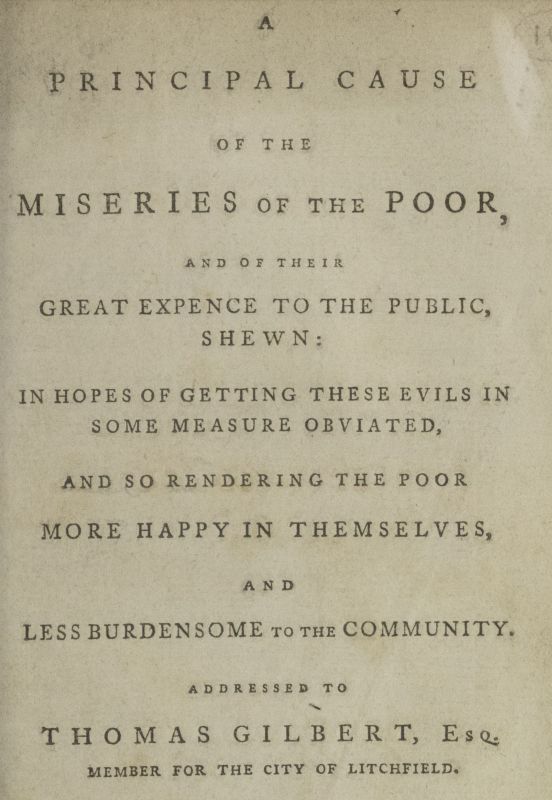
1782
The Poor Relief Act of 1782, also known as the Gilbert’s Act, allows parishes to form unions and build joint poorhouses for the elderly, sick and orphaned. The able-bodied were to be provided with outdoor relief or employment.
1816
The repeal of income tax.
1819
Peterloo Massacre takes place at St Peter’s Field, Manchester, when cavalry charge into a large crowd gathered to demand the reform of parliamentary representation.
1820
Death of George III; George IV becomes king.
1821
British Ladies’ Society for Promoting the Reformation of Female Prisoners is founded by Elizabeth Fry.
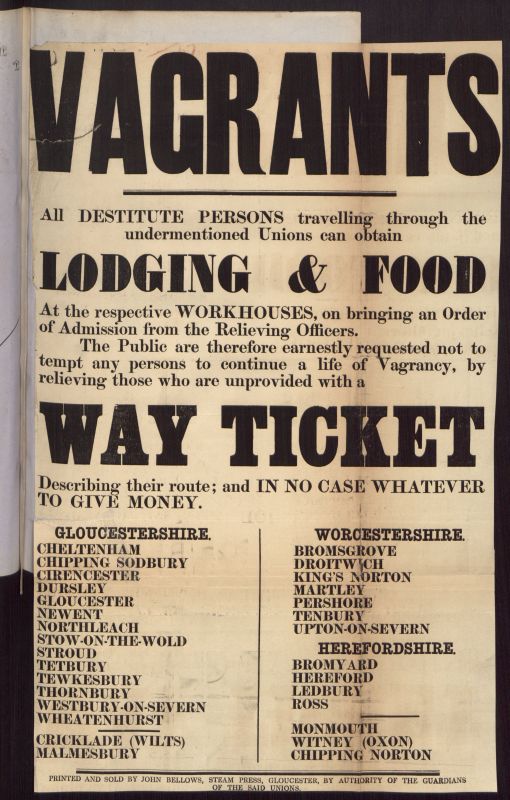
1824
Vagrancy Act makes it illegal to sleep in the open or beg on the streets.
1829
Metropolitan Police Service is established by Robert Peel under an act from parliament. The act replaces the parish constables and watchmen and enables a more organised system of policing.
1829
The Roman Catholic Relief Act is the culmination of the process of Catholic Emancipation in the United Kingdom.
1830 - 1834
Charles Grey, 2nd Earl Grey, Whig.
1830
Swing Riots begin in Kent as a response to the poor harvest, increased population, increased use of threshing machines and consequent reduction in poor law funds.
1830
George IV dies; William IV succeeds him.
1831
Cholera outbreak prompts investigation from the medical community into living conditions.
1832
Royal Commission into the Operation of the Poor Laws in England and Wales begins reviewing the Poor Law system.
1832
Reform Act abolishes most of the “rotten boroughs” and redistributes representation to new population areas, such as northern industrial towns. It also allows men who own property and earn more than £10 a year to vote.
1833
Factory Act is passed to improve conditions for children working in factories. It legally prohibits children under the age of 9 from working in textiles factories and restricts working hours for children.
1833
The Slave Emancipation Act ends slavery in British colonies, albeit after a set period of years.
1833
Royal Commission for inquiring into the condition of the poorer classes in Ireland begins.
1834
William Lamb, 2nd Viscount Melbourne, Whig.
1834
Arthur Wellesley, 1st Duke of Wellington, Tory.
1834 - 1835
Sir Robert Peel, 2nd Baronet, Conservative.
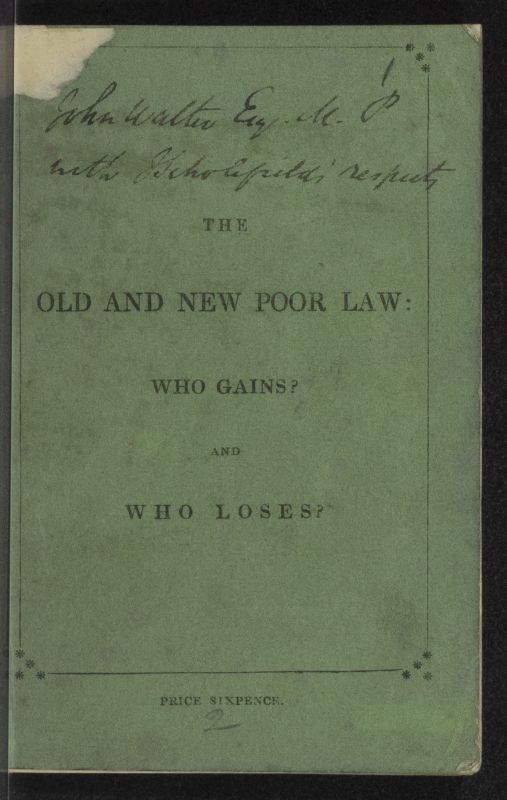
1834
Poor Law Amendment Act (New Poor Law) replaces earlier legislation in England and Wales, and sees the Poor Law Commission established.
1835 - 1841
William Lamb, 2nd Viscount Melbourne, Whig.
1835
Municipal Corporations Act (or Municipal Reform Act) reforms local government in England and Wales into boroughs as part of the Whig reforms which started with the Reform Act of 1832.
1835
Abingdon becomes the first new Poor Law Union.
1837
King William IV dies and Queen Victoria becomes Queen of England.
1837 - 1839
Oliver Twist by Charles Dickens is published, originally as a serial.
1838
Irish Poor Law Act is passed, influenced by the 1834 Poor Law Act for England and Wales.
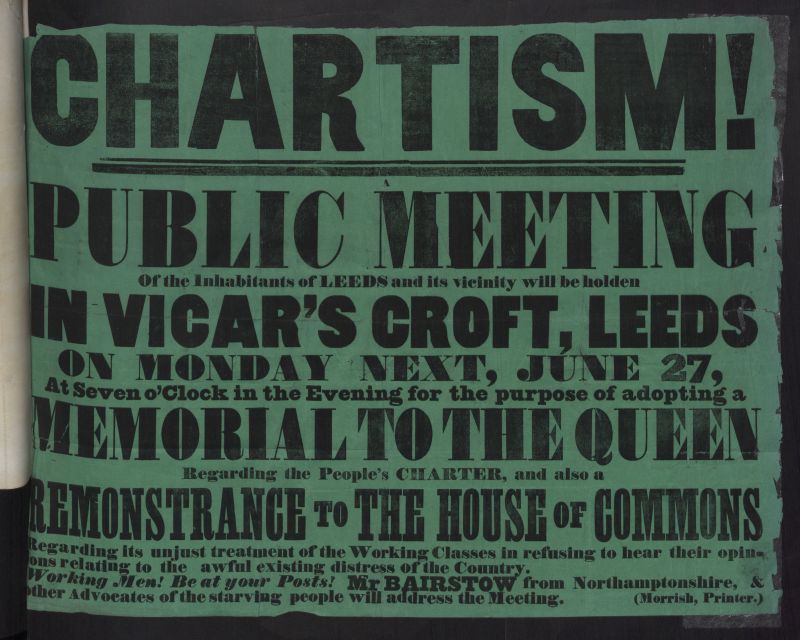
1839
First Chartist petition is presented to parliament. It is almost three miles long and contains over 1.2 million signatures.
1839 - 1843
Rebecca Riots in Wales undertaken by farmers in response to taxation and tolls charged to use the roads.
1840
Vaccination Act enables local poor law authorities to vaccinate the poor at the expense of ratepayers.
1841 - 1846
Sir Robert Peel, 2nd Baronet, Conservative.
1842
Outdoor Labour Test Order allows outdoor relief to be provided to able-bodied men who meet the requirements of a labour test.
1842
Income Tax Act reinstates income tax in Britain.
1842
Mines and Collieries Act legally prohibits all women and girls, and boys under the age of 10 years, from working in mines.
1842
Edwin Chadwick publishes ‘Report into the Sanitary Condition of the Labouring Population of Great Britain’ which links disease and living conditions.
1842
Pentonville prison is opened.
1842
Second Chartist Petition, which is signed by 3.3 million people.
1843
Royal Commission for inquiring into the condition of the poorer classes in Scotland begins.
1844
Outdoor Relief Prohibitory Order prohibits outdoor relief to able-bodied paupers except in certain circumstances.
1844
Factory Act prohibits children between the ages of 8 and 13 from working more than six and a half hours a day in textiles factories. It also reduces hours of work for women and young people aged between 13 and 18 to a maximum of 12 hours per day.
1844
Association for Promoting Cleanliness Amongst the Poor is founded.
1845
Andover Workhouse Scandal: discovery of poor conditions in Andover workhouse, where rations are less than the subsistence diet outlined by the Poor Law Commission, leading to starving inmates eating marrow and gristle off bones.
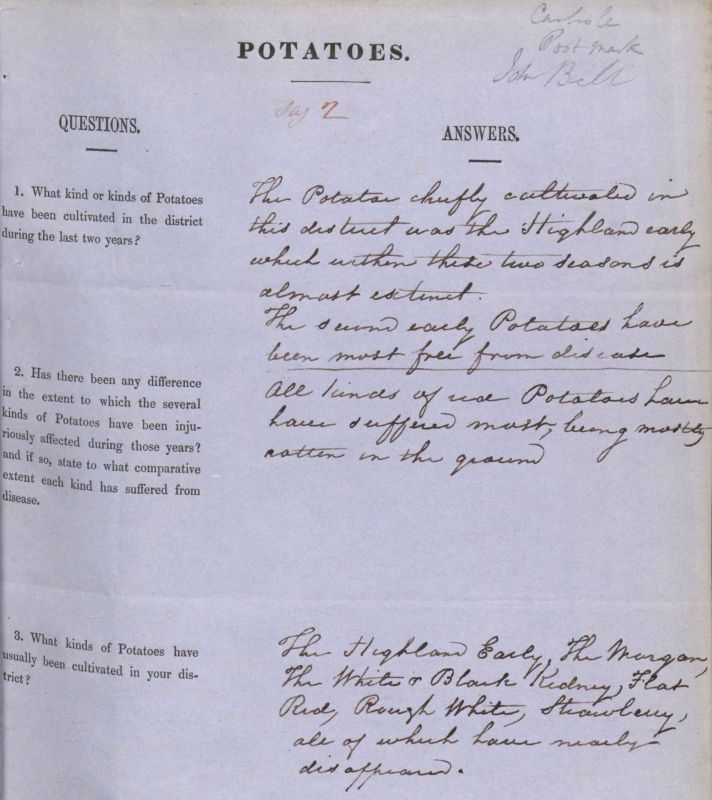
1845 - 1849
Irish Potato Famine begins, which would last for four years.
1845
Scottish Poor Law Act is passed. A Board of Supervision is created to monitor the new system of poor relief. Its responsibilities are later extended to include public health from 1867.
1846 - 1852
Lord John Russell, 1st Earl Russell, Whig.
1846
Select committee is set up to investigate the Andover Workhouse and workings of the Poor Law Commission in general.
1846
Nuisance Removal and Diseases Prevention Act sets out procedures for the removal of 'nuisances' and increased powers of the Privy Council to set regulations for the prevention of infectious diseases.
1847
Poor Law Administration Act sees the Poor Law Board replace the Poor Law Commission in England and Wales.
1848
Huddersfield Workhouse Scandal: discovery of poor conditions including overcrowding and disease.
1848
Third Chartist Petition.
1848
The Public Health Act is passed, establishing the first General Board of Health and authorising the creation of local Boards of Health. This aims to improve sanitation of towns in England and Wales.
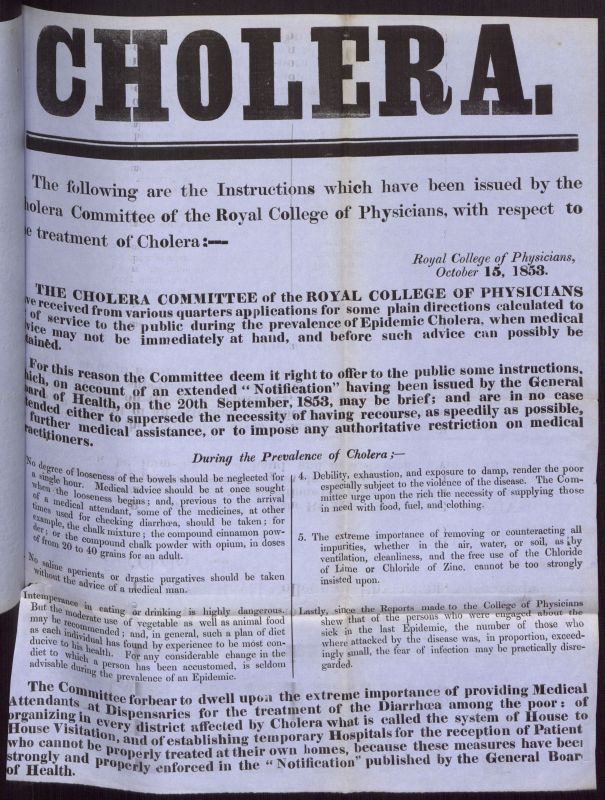
1848 - 1849
Cholera outbreak.
1849
Metropolitan Sanitary Association is established in London, which seeks to improve the living and working conditions in London districts.
1852
Edward Smith Stanley, 14th Earl of Derby, Tory and Whig.
1852 - 1855
George Hamilton Gordon, Earl of Aberdeen, Conservative.
1852
Outdoor Relief Regulation Order includes restrictions on sick, elderly and widowed paupers.
1853
Infant vaccination against smallpox becomes compulsory.
1853
Poor Law Medical Reform Association is created.
1854
Establishment of the second General Board of Health and appointment of Sir John Simon as first Medical Officer.
1854
Youthful Offenders Act establishes Reformatory Schools for young offenders under 16 years of age.
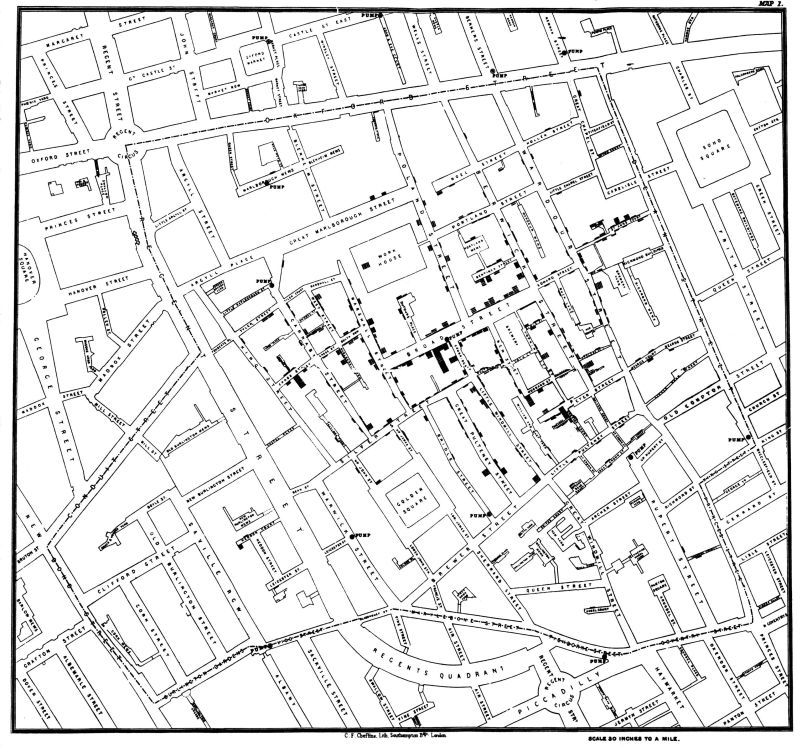
1854
The Broad Street cholera outbreak in London is investigated by physician John Snow, who identifies that germ-contaminated water was transmitting the disease.
1855 - 1858
Henry John Temple, 3rd Viscount Palmerston, Whig and Liberal.
1856
Florence Nightingale returns from the Crimean War and begins to promote sanitary nursing.
1857
Obscene Publications Act gives the courts power to seize offending material.
1858 - 1859
Edward Smith Stanley, 14th Earl of Derby, Tory and Whig.
1858
Louisa Twining creates the Workhouse Visiting Society which aims to improve the moral and spiritual condition of workhouse inmates.
1858
Local Government Act strengthens the powers of local boards of health and Public Health Act transfers the role of Medical Officer from the General Board of Health to the Privy Council.
1859 - 1865
Henry John Temple, 3rd Viscount Palmerston, Whig and Liberal.
1859
Wilkie Collins publishes The Woman in White, the first great sensation novel. It exploits fears about the Lunacy Laws, which were open to exploitation by unscrupulous husbands and 'the mad doctors'. It was also based on popular cases of husbands exploiting the married women’s property rights.
1864
Contagious Diseases Act legalises the arrest of women on suspicion of prostitution so that they could be medically examined in order to prevent venereal disease.
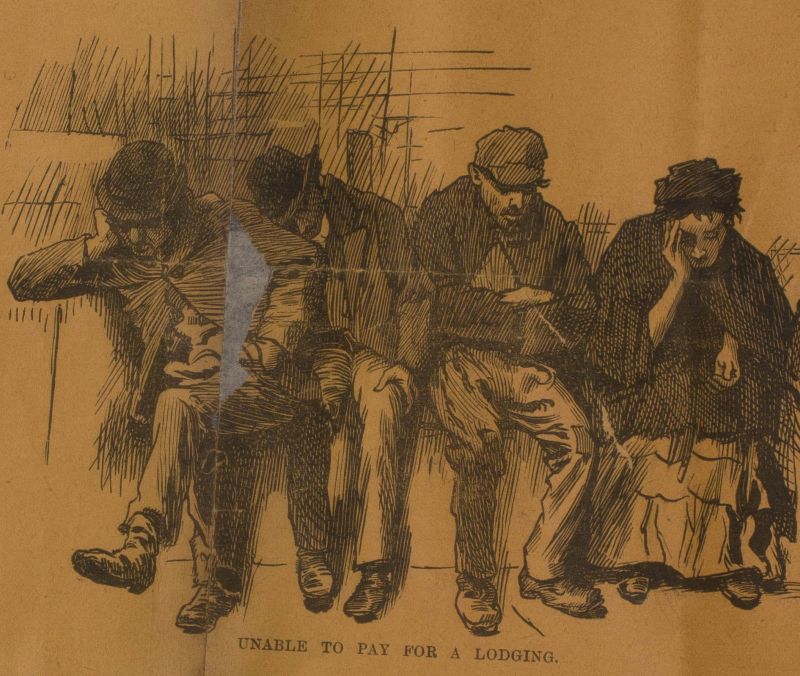
1864
Metropolitan Houseless Poor Act requires Boards of Guardians to create casual wards for temporary accommodation for wandering poor.
1865 - 1866
Lord John Russell, 1st Earl Russell, Whig.
1865
Union Chargeability Act moves the cost of poor relief from the parish to the union.
1865
The Salvation Army is founded by William and Catherine Booth.
1866 - 1868
Edward Smith Stanley, 14th Earl of Derby, Tory and Whig.
1866
A Night in a Workhouse by James Greenwood published.
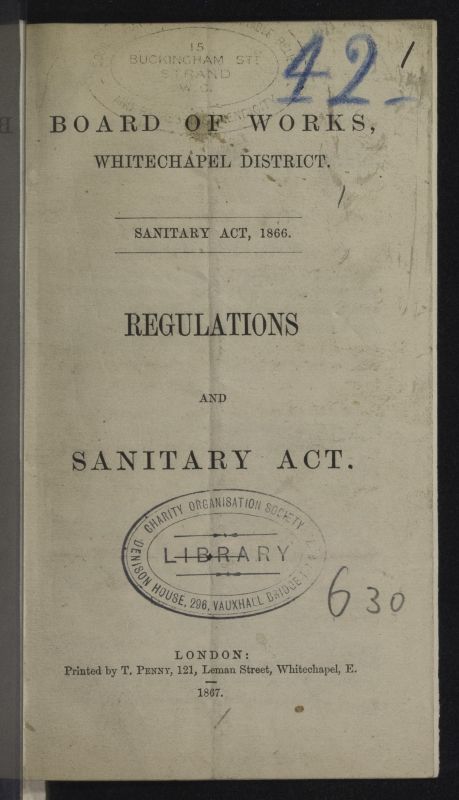
1866
Sanitary Act is passed making local authorities in England and Wales responsible for providing clean water, sewage systems and waste disposal.
1867
Second Reform Act enfranchises some urban working-class men for the first time.
1867
Metropolitan Poor Act is passed and the Metropolitan Asylums Board created.
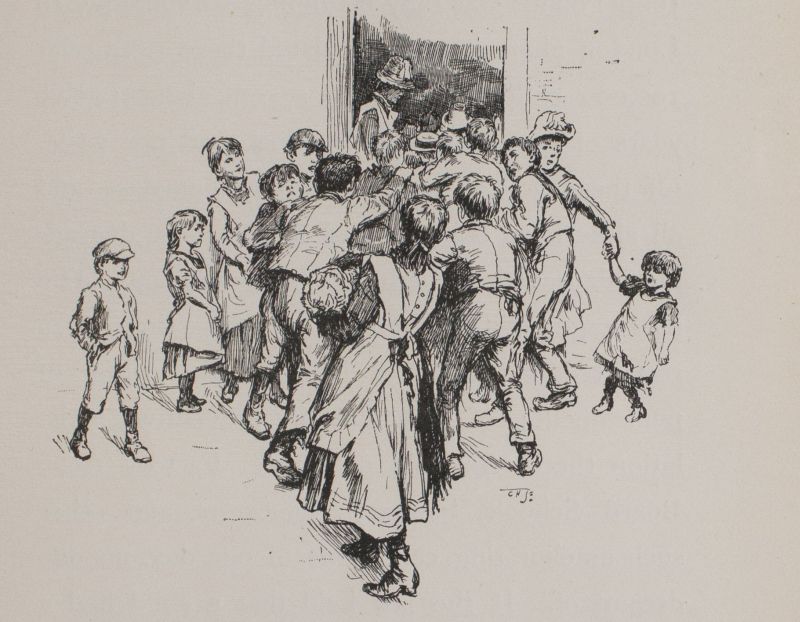
1867
Thomas John Barnardo sets up a ‘ragged school’ where children could get a basic free education, and later in 1870 opens his first home for boys.
1868
Benjamin Disraeli, the Earl of Beaconsfield, Conservative.
1868 - 1874
William Ewart Gladstone, Liberal.
1868
Artisans' and Labourers' Dwellings Improvement Act (Torrens' Act) compels homeowners to demolish or repair unsanitary dwellings.
1868
Capital Punishment Amendment Act sees last public execution in the UK. The act requires those sentenced to death to be executed within the prison walls.
1869
The ‘Goschen Minute’, written by George Goschen, head of the Poor Law Board, addresses the perceived failings in controlling outdoor relief provision since the introduction of the 1834 Poor Law Act and refers to the coordination of poor relief and private charity. This forms the basis for the more restrictive approach to the provision of outdoor relief implemented by the Poor Law Board’s successor, the Local Government Board, after 1871. The number of people receiving outdoor relief fell sharply during the 1870s as a result.
1869
The Charity Organisation Society (later The Family Welfare Association) is founded by social reformers, including Octavia Hill, William Gladstone and John Ruskin, to improve the effectiveness of charitable giving to the poor.
1869
National Education League is founded to promote compulsory and non-religious elementary education for all children.
1869
National Association for the Repeal of the Contagious Diseases Acts is established, quickly followed by the Ladies National Association for the Repeal of the Contagious Diseases Acts, which is established the same year by Elizabeth Wolstenholme and Josephine Butler.
1870
British Red Cross Society is founded, originally called ‘British National Society for Aid to the Sick and Wounded in War’.
1870
Elementary Education Act, commonly known as Forster’s Education Act, begins provisions for compulsory universal schooling in England and Wales for children between the ages of 5 and 12. A similar Act is passed in Scotland in 1872.
1870
Married Women’s Property Act allows married women to be the legal owners of the money they earn and to inherit property.
1871
Local Government Board Act establishes the Local Government Board in England and Wales, replacing the Poor Law Board. The Act reflected some of the recommendations of the Royal Sanitary Commission, and the new department also became responsible for the central supervision of local public health administration.
1871
Bank Holidays Act establishes the first bank holidays in the UK.
1871
Trade Union Act legalises trade unions for the first time.
1872
The Nine Hours Strike takes place in Newcastle upon Tyne, in which engineers demand that a normal working day should consist of no more than nine hours. The strike continues for fourteen weeks before the masters succumb.
1872
Local Government Board (Ireland) Act is passed, influenced by the 1871 Act for England and Wales and replacing the Irish Poor Law Commission.
1873
Judicature Act reorganises the court system to establish the High Court and the Court of Appeal.
1874 - 1880
Benjamin Disraeli, the Earl of Beaconsfield, Conservative.
1874
Factory Act raises the minimum working age to nine; limits the working day for women and young people to 10 hours and reduces the working week to 56½ hours.
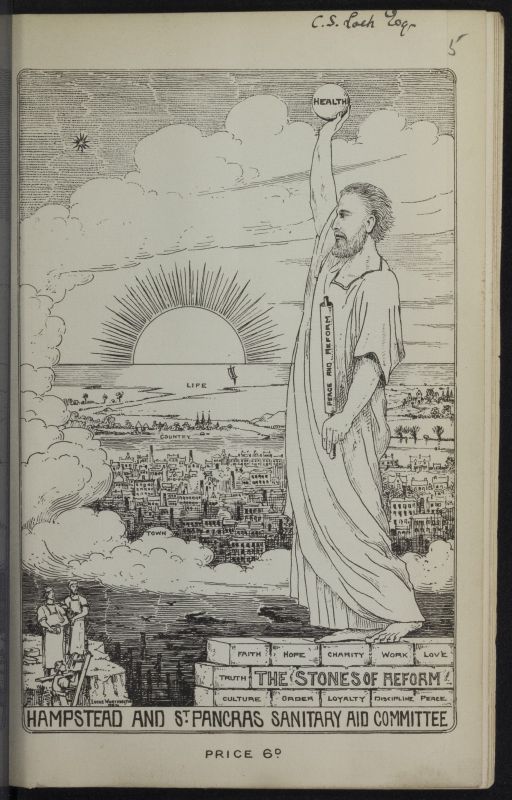
1875
Public Health Act consolidates all sanitary legislation passed since 1848. The authorities are provided with the power to repair or create sewers, control water supplies and regulate living conditions, including clearing slums.
1875
Artisans’ and Labourers’ Dwellings Improvement Act enables local councils to purchase areas of slum dwellings to rebuild them.
1875
Conspiracy, and Protection of Property Act establishes the principle that a trade union can not be prosecuted for an act which would be legal if performed by an individual.
1875
Employers and Workmen’s Act allows contract disputes to be covered by civil law. Together with the Conspiracy and Protection of Property Act, it fully decriminalises the actions of trade unions.
1875
First female Poor Law Guardian Martha Crawford Merrington is elected to the Kensington Union.
1876
Royal Commission on the Factory Acts recommends that education be made compulsory in order to stop child labour.
1878
Factories and Workshops Act (the 'Consolidation Act') consolidates and amends all the previous Factory Acts. 10 to 14 year olds can only be employed for half days and maximum hours for women is limited to 56 hours per week.
1879
Workhouse Infirmary Nursing Association is created by Louisa Twining to organise training and act as an employment agency for nurses in Poor law infirmaries and workhouses.
1880 - 1885
William Ewart Gladstone, Liberal.
1880
Burial Laws Amendment Act gives individuals the right to be buried without any religious service or with a non-Anglican Christian service.
1880
Education becomes compulsory for children under 10 years of age.










